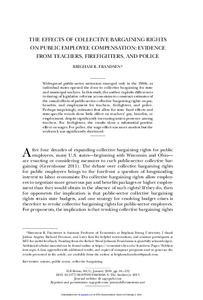The effects of collective bargaining rights on public employee compensation. Evidence from teachers, firefighters, and police

2016
69
1
January
84-112
collective bargaining ; police ; public sector ; teaching personnel ; trade union role ; fire fighter
Collective bargaining
http://dx.doi.org/10.1177/0019793915603068
English
Bibliogr.
"Widespread public-sector unionism emerged only in the 1960s, as individual states opened the door to collective bargaining for state and municipal workers. In this study, the author exploits differences in timing of legislative reforms across states to construct estimates of the causal effects of public-sector collective bargaining rights on pay, benefits, and employment for teachers, firefighters, and police. Perhaps surprisingly, estimates that allow for state fixed effects and state-specific trends show little effect on teachers' pay, benefits, or employment, despite significantly increasing union presence among teachers. For firefighters, the results show a substantial positive effect on wages. For police, the wage effect was more modest but the workweek was significantly shortened."
Digital
The ETUI is co-funded by the European Union. Views and opinions expressed are however those of the author(s) only and do not necessarily reflect those of the European Union or the ETUI.